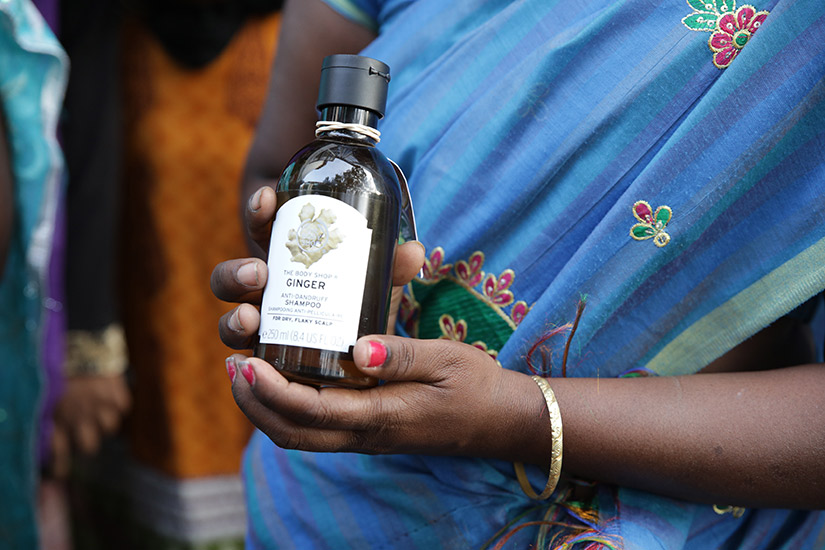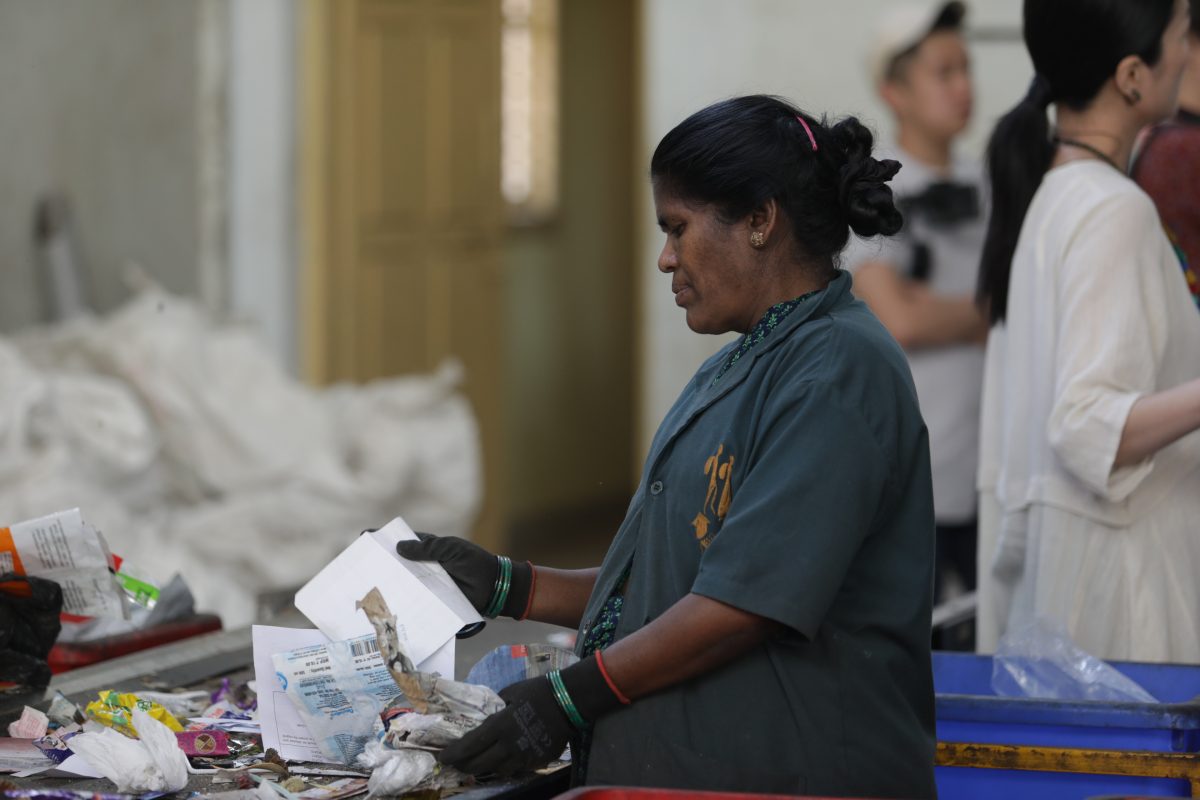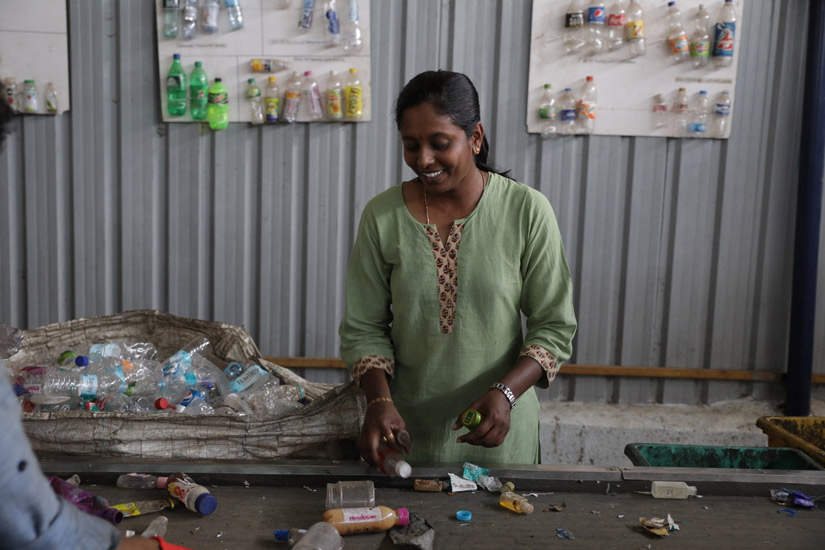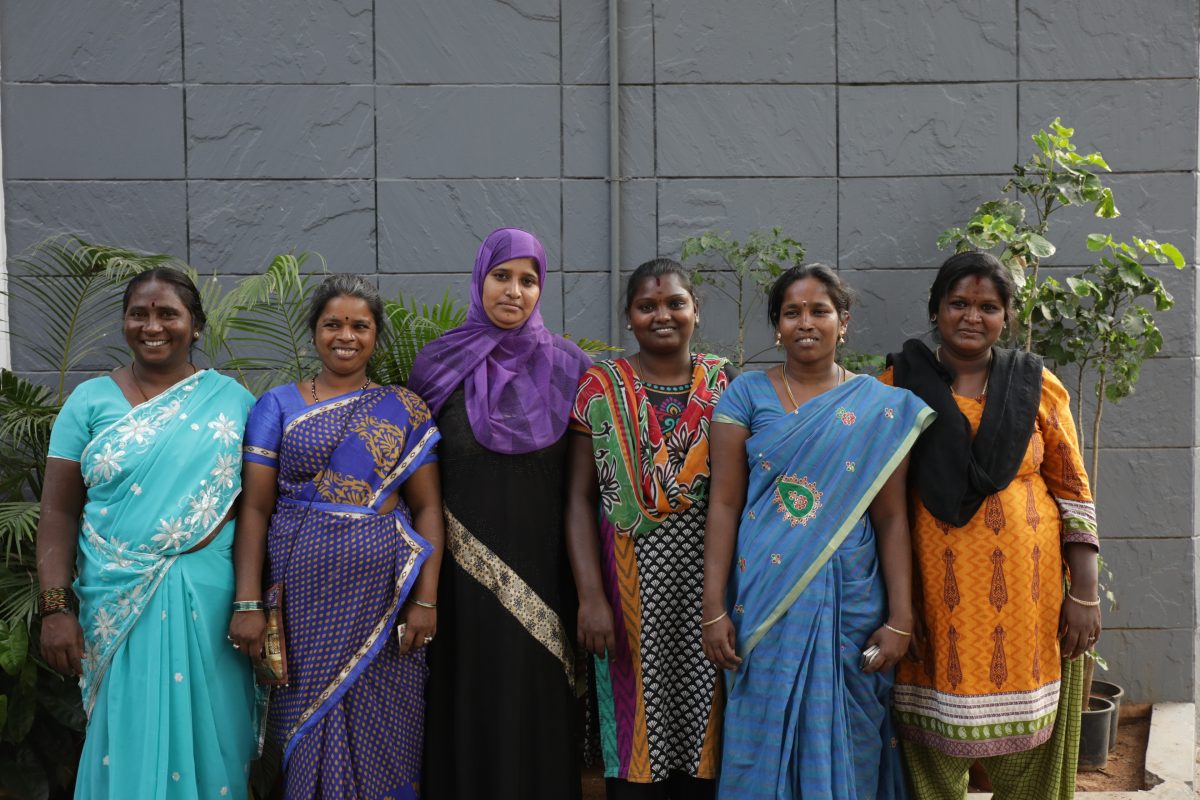Hair
The World's First Fair-Trade Plastic Is Now Available In Beauty Packaging
by : Victoria DiPlacido- May 15th, 2019

We partnered with Hidden Beauty podcast to tell the story behind how a popular deodorant in the 1950s marked the beginning of the cosmetic industry’s affinity for plastic packaging, and what some of today’s biggest beauty brands, like The Body Shop, are doing to reduce plastic waste. Listen below.
The world has a plastic problem. In Canada, less than 11 percent of plastics are recycled, which is only marginally better than the abysmal 9 percent global recycling rate. This leaves a staggering amount of recyclable plastic sitting in landfills and polluting the natural environment; by 2050, it’s estimated that there will be more plastic than fish in the oceans.
Historically, the global cosmetics industry hasn’t exactly helped matters. A recent estimate suggested it produces 120 billion units of packaging annually—the majority of which is not recyclable.
As consumers become increasingly vocal about their dislike for excess packaging (beauty industry watchdog @esteelaundry on Instagram regularly kicks off impassioned threads on the topic) brands are finding creative solutions to cut down on waste, like incorporating ocean plastic into packaging, and in some cases, moving away from plastic altogether, in favour of materials like glass or aluminum.
The Body Shop is taking a unique approach.
“We believe in tackling the plastic crisis differently,” says Lee Mann, global community trade manager for the U.K.-based retailer. “Plastic is not the enemy; it’s what [people] are doing with it that’s the problem,” he says, referring to deplorable global recycling habits.
In addition to reducing its overall packaging needs, The Body Shop has partnered with social enterprise Plastics For Change to introduce the world’s first fair-trade recycled plastic into their packaging, starting with 250 mL hair-care bottles.
This new Community Trade initiative will improve working conditions and provide reliable income and fair wages for waste pickers—those who make their living collecting and processing waste in areas of the world without formal waste management—in Bengaluru, India.
“We’ve got 32 years of Community Trade experience working directly with marginalized people around the world to trade in materials that they have access to,” says Mann. “I was convinced we could apply that [knowledge] to tackle one of the world’s biggest problems today, both environmental and social, with plastics.”
This year, The Body Shop has purchased 250 tonnes of recycled plastic from waste pickers in Bengaluru as part of its Community Trade program. The goal is to scale the initiative over the next three years until all their polyethylene terephthalate (PET) plastic packaging comes solely from Community Trade.
(The 250 mL hair-care bottles are already made from 100% recycled plastic, but currently only fifteen percent of it is sourced from the new program.)

A waste picker sorting dry waste in Bengaluru, India.
Bengaluru, located in southern Indian, is the country’s third most populated city, with a population of over ten million people. It’s grown rapidly, in part due to being a major tech hub, drawing in hordes of recent grads and entrepreneurs. Its also known as the “garden city” thanks to its expansive public parks and tree-lined streets. Colloquially, though, it’s now being called the “garbage city” because of waste management concerns.
There are about 35,000 waste pickers in Bengaluru who perform the challenging manual labour of picking up waste from streets, businesses and private homes in the city. Though they provide essential waste management services, collecting 1,050 tonnes of recycling from the city each day, waste pickers have low social status; it’s a role that has traditionally been associated with Dalits, also called “untouchables,” the lowest rung in India’s caste system. That reputation is slowly changing.
“We call them silent environmentalists,” says social activist Nalini Shekar, co-founder of Hasiru Dala (which literally means “green force” in the local language Kannada), a non-profit that works with Body Shop partner Plastics For Change and helps waste pickers gain access to social services and market opportunities.
The Body Shop agrees, with Mann calling waste pickers “one of the best lines of defence” for stopping plastics from getting into the environment in parts of the world without formal waste management systems.

Krupa Rani, above, runs the plastic aggregation centre in Bengaluru, India that sorts and bales plastic to be used in The Body Shop packaging. Behind her, examples of acceptable and non-acceptable plastics.
Here’s how it works: waste pickers in Bengaluru collect dry waste, like paper, plastic and other recyclable materials, from around the city and bring it to a scrap-shop dealer who sort the waste. Plastics are then sent to an aggregation centre, where they are again sorted to meet The Body Shop’s stringent requirements. Only food-grade Polyethylene terephthalate (PET) plastic makes the cut—if the plastic has a coloured tint or if the label can’t be removed, it’s a no-go. Acceptable plastics are then crushed into bales and sent abroad to Europe to be processed into new packaging. (There are currently no facilities in India to do this.)
Exploitation within the informal waste management supply chain is another concern The Body Shop’s new program is helping to address. Waste pickers often don’t know when, or how much, they will be paid; the price of plastic, a petroleum derivative, fluctuates—sometimes drastically—with global oil prices.
“When I first came to Bengaluru in 2015, the petroleum prices had dropped, so it was cheaper for companies to use virgin fossil fuel plastic instead of recycled plastic,” says Andrew Almack, the Canadian founder of Bengaluru-based Plastics For Change. This led to a 60 percent drop in the price waste pickers received for plastics—a considerable blow, when you consider that plastic brings in about 45 percent of a waste picker’s overall income.
Plastics For Change has created a mobile platform to build transparency and accountability throughout the supply chain, helping waste pickers know where they can get access to fair markets.
Waste pickers, who are mostly illiterate, are able to access the platform through SMS and voice messaging in five local languages on their mobile phones (more people in India have access to them than they do proper sanitation). The platform creates a record of every transaction, allowing for full traceability in The Body Shop’s supply chain, right down to the name of the waste picker who sold the plastic and they price they received for it.
“With The Body Shop’s leadership in stabilizing the price, it allows the waste picker’s price to be less volatile,” explains Almack.

Some of the waste pickers in Bengaluru, India interviewed for this story. From left: Indira, Annamma, Parveen Taj, Vijaya Lakshmi, Alamelu, Monisha.
Annamma, one of several waste pickers interviewed for this story, began picking waste at 10-years-old to help support her family, who were also waste pickers. Now in her forties, she runs her own dry waste collection centre—an opportunity she gained through work with Hasiru Dala—and employs six people, including her husband.
She speaks proudly of her career, which has allowed her to purchase her own home and send her three daughters to school. She was the first female waste picker in Bengaluru to get her own vehicle for door-to-door collection of dry waste—a success so notable it netted her a mention in a local newspaper, which she says her daughters showed off to classmates.
Shekar Prabhakar, co-founder of Hasiru Dala, tells the story of another waste picker, the very first the non-profit worked with four years ago. “He was a scrap dealer and had almost nothing, just making ends meet,” says Prabhakar. “Today, he owns two trucks, employs 22 waste pickers and just last month bought a ₹100,000 rupee (about $1,950 CDN dollars) scooter on a loan from the bank.”
“This is the quantum change we want to bring about in waste pickers’ lifetimes,” he adds. “What more could we ask for?”
Newsletter
Join our mailing list for the latest and biggest in fashion trends, beauty, culture and celebrity.
Read Next

Beauty
The Best Met Gala Beauty Looks Of All Time
From Taylor Swift's 'Bleachella' era to Rihanna's iconic 2011 braids, meet the best beauty moments in Met Gala history.
by : Katie Withington- Apr 26th, 2024

Culture
Benny Blanco Says He Fell in Love With Selena Gomez Without ‘Even Noticing’ It
Allow Benny Blanco to tell the straight-from-a-rom-com story of how he realized his feelings for his girlfriend and longtime friend.
by : Alyssa Bailey- Apr 26th, 2024

Culture
ELLE Escapes: Savannah
Where to go, stay, eat and drink in “the Hostess City of the South.”
by : ELLE- Apr 15th, 2024




